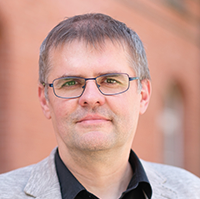Witold Konopka

Title
HE Twinning – SAME-NeuroID – Standardized approaches to modelling and examination of neuropsychiatric disorders
Abstract
Horizon Europe Widening programs such as Twinning and Teaming for Excellence enable the development of modern, efficient research institutions in Poland through the transfer of best practices in research management, technology transfer and education from more advanced European partners. This PORT objective of SAME-NeuroID Twinning was actively supported by our partners in the field of neuroscience: Paris Brain Institute (ICM, France), Max Planck Institute of Psychiatry (MPI, Germany) and Erasmus Medical Center (EMC, Netherlands). The scientific focus of this initiative is based on the shared vision of the consortium partners to develop standardized interlaboratory approaches to the modeling of neuropsychiatric diseases.
We have developed an advanced in vitro platform providing a coherent workflow for reproducible and robust modelling of neuropsychiatric traits. Building on the expertise of our partners from EMC (Rotterdam) and ICM (Paris), we established a state-of-the-art set of models that uniquely recapitulates the genetic environment of the human brain in a dish. Our assays include iPSC-derived 2D cultures of neurons and glial cells as well as innovative iPSC-based 3D brain organoids with the advantage of self-organization and formation of advanced brain-like structures.
The collaboration between MPI Psychiatry (Munich) and PORT focused on affordable setup for automated measures of complex behavior in mice. The twin system has been established and validated in both laboratories, along with analytical pipeline. The hardware features the rectangular arena, a camera, and a light sources enabling video recording under white and red light condition, to enable monitoring active and inactive phases of the day. The analytical workflow is based on AI-supported software for reliable tracking of individual animals (DeepLabCut, SLEAP.ai), and interpretation of behavioral traits based on pose estimation (deepOF). Coherent data obtained from the two labs provided the resolution of behavioral changes elicited by chronic social defeat stress with unprecedented detail.
The SAME-NeuroID platform provides a powerful toolbox for studying brain function under both physiological and pathological conditions and serves as a foundation for future translational research in mental health disorders.
Biography
He received the PhD at Nencki Institute in Warsaw and accomplished postdoctoral training at German Cancer Research Center (DKFZ), Heidelberg (Guenther Schuetz lab). From 2012 he ran the Laboratory of Animal Models and in 2014-2018 he was a deputy director for scientific affairs at the Nencki Institute.
“In the PORT Research Group, we study the precise mechanisms that regulate peripheral metabolism by the brain. We focus on regulation of eating – especially the feeling of hunger and satiety. We are interested in how neurons modify their activity in response to both internal and external signals, informing the brain of such physiological states. Understanding these phenomena will help in the fight against eating disorders such as anorexia and the pandemic of the modern world – obesity”.
